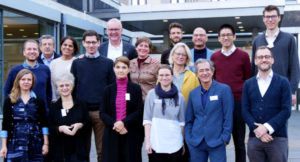How the United Nations (UN) is funded has far-reaching implications for its functioning and performance, as well as for the distribution of power and influence within the organisation. Historically grown financing patterns are currently confronted with new requirements for multilateral cooperation.

The two-day workshop “Funding the UN system” was jointly organised by IDOS (Dr Max-Otto Baumann and Dr Sebastian Haug), the Overseas Development Institute (ODI) (Nilima Gulrajani) and the University of Glasgow (Dr Bernhard Reinsberg). It brought together a group of researchers, practitioners and experts to discuss the latest research on and reform perspectives for UN financing. The dominance of earmarked contributions in particular places a heavy burden on the UN and its multilateralism. This calls for reforms.
On the one hand, the workshop discussions highlighted that the small proportion of assessed and core contributions for the UN system and its entities does not only represent an administrative problem for the UN with regard to operational planning. An excess of earmarking also translates into a lack of resources for the normative functions of the UN. In the operational area of UN development work, the earmarking practice has a negative impact on the effectiveness of the UN.
On the other hand, the discussions underlined that in an unequal world, there are not always convincing alternatives to earmarked financing. The UN’s human rights work, for which there would otherwise hardly be enough resources, relies primarily on earmarked funds. There is therefore a need for a better understanding of the different forms of core financing and the (dis)advantages each modality presents depending on the organisational context.
The results of the workshop will be used for policy advisory contributions to ongoing reform processes at the UN. One of these contributions will be published by Max-Otto Baumann and Sebastian Haug and examines the financing of the UN, and thus also UN multilateralism, and identifies opportunities for reform. The results are to be presented at the UN in New York in 2024.

Schreibe einen Kommentar